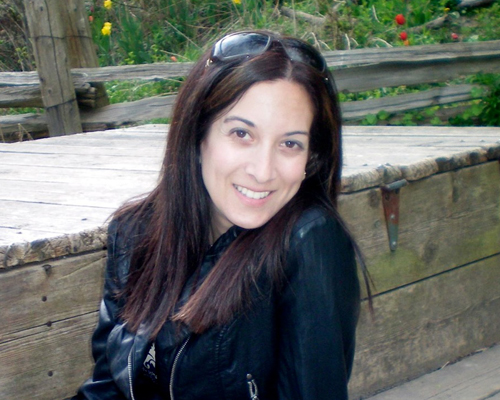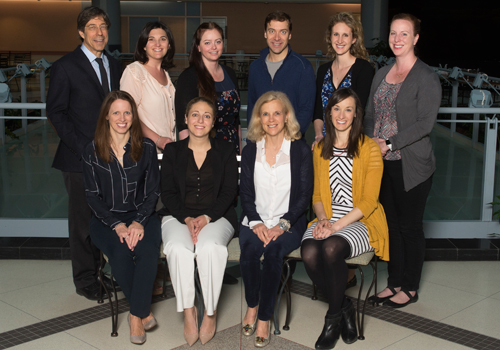
Miriam Porter had preventive surgery to remove her ovaries and fallopian tubes – a surgery that reduces her risk of developing breast cancer by 50 per cent and ovarian cancer by 90 per cent or more. (Photo: Miriam Porter)
Miriam Porter of Toronto has always considered herself a private person. But the night before her preventive surgery to remove her fallopian tubes and ovaries, she decided it was time to
share her story. Inspired by a host of friends who have chosen to "go public" to raise awareness of ovarian cancer, she wrote about her love for her son and her desire to be with him as he grows up.
Over the past few years, Miriam has learned that ovarian cancer is often hereditary and that she has a high risk for both breast and ovarian cancer. Four relatives had breast cancer and she is also an Ashkenazi Jew, a group with a higher than usual proportion of carriers.
Women at risk for ovarian cancer in Ontario
Historically, only about 23 per cent of women with ovarian cancer participate in genetic testing. But as Dr. Marcus Bernardini, gynecologic oncologist at Princess Margaret Cancer Centre, says, "That is far too low. We believe there are between 10,000 and 15,000 women in Ontario who may be at risk and not know it."
Research has proven that there is a strong link between
BRCA1 and
BRCA2 genetic mutations and ovarian cancer. There are likely other genetic elements as researchers probe the human genome further. If a first-degree relative – a mother, sister or daughter – has been diagnosed with ovarian cancer, the risk of developing cancer is much higher than it is for the general public.
The statistics are clear: Carriers of a BRCA1/2 genetic mutation have up to a 40 per cent chance of developing ovarian cancer compared to only two per cent of the general population.
So Dr. Bernardini and his team of researchers and genetic counsellors have developed
the Prevent Ovarian Cancer Program to identify more women with a
BRCA1/2 mutation and provide them with the counselling they need to make decisions about preventing ovarian cancer.

Members of the Prevent Ovarian Cancer Program are helping to identify more women with a BRCA1/2 mutation to help them make informed decisions about preventing ovarian cancer. (UHN Photographics)
Prevent Ovarian Cancer Program: Criteria and how you can get involved
The Prevent Ovarian Cancer Program is looking for women 18 years or older living in Ontario who have a first-degree relative (mother, daughter, sister) diagnosed with high grade serous cancer.
Researchers on the Prevent Ovarian Cancer Program will be collecting some of this new information for research purposes. Using the
Prevent Ovarian Cancer Program website, participants will be asked to:
- Give permission to access the pathology report for the first-degree relative with ovarian cancer;
- Fill in a family history questionnaire;
- Provide a blood sample for genetic testing;
- Complete five psychosocial questionnaires;
- Undertake pre/post-genetic counselling.
The good news is that women can participate wherever they live. Blood samples can be provided at any LifeLabs facility and genetic counselling is available by phone or face-to-face in most areas of the province.
'Changing the way we approach genetic testing in Ontario and nationwide'
"As a supporting partner, we see potential for this program to change the way we approach genetic testing , not only in Ontario but nationwide," says Elisabeth Baugh, CEO at Ovarian Cancer Canada.
"The more women know about their risk, the sooner they can take action to prevent ovarian cancer."
Because the program is in its very early stages, there is funding for 500 participants. If you know someone whose mother, sister or daughter has been diagnosed with ovarian cancer, don't delay. Tell them about the
Prevent Ovarian Cancer Program to see if they may be eligible to participate in the Prevent Ovarian Cancer Program.
For women like Miriam Porter, Angelina Jolie and many, many more, having the knowledge of their genetic status is powerful.
"I believe it is better to do something than nothing at all," says Miriam.
"What I do know is that we all have the power to surround ourselves with life-saving information. I will no longer remain silent."
For more information on the Prevent Ovarian Cancer Program, visit the
Prevent Ovarian Cancer Program website or contact the program's voice messaging system at 1 866 330 0180 or email
preventovariancancer@uhnresearch.ca.
